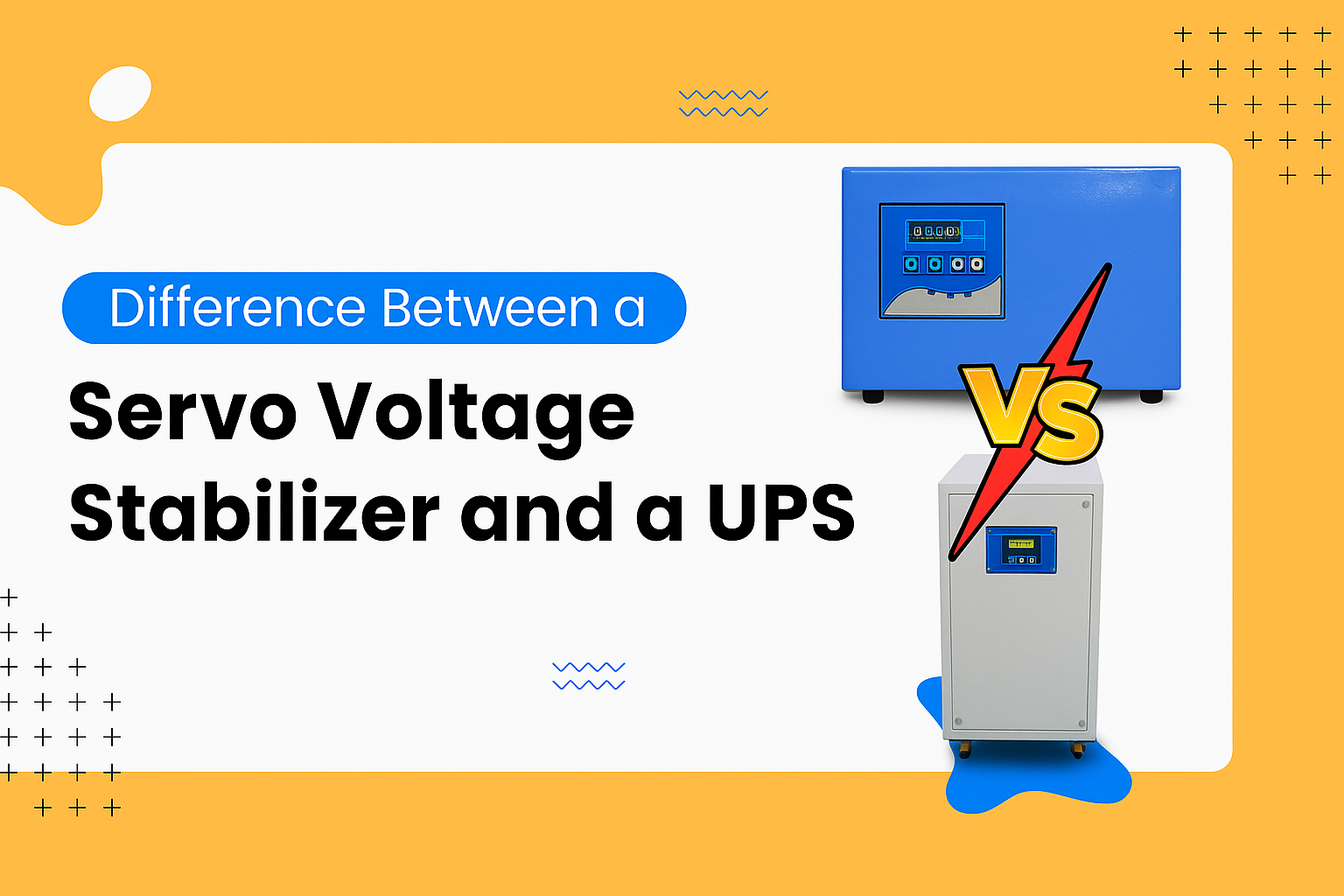Electricity fluctuations are a common issue in India, affecting both industrial and residential power supply. To ensure the smooth functioning of electrical appliances and machinery, businesses and homeowners often rely on Servo Voltage Stabilizers and Uninterruptible Power Supplies (UPS). While both devices help in power management, they serve different purposes.
For those looking for a servo voltage stabilizer, it is essential to understand the key differences between a Servo Voltage Stabilizer and a UPS to choose the right solution for your needs.
What is a Servo Voltage Stabilizer?
A Servo Voltage Stabilizer is an advanced voltage correction device that ensures a constant voltage supply to electrical appliances. It is mainly used to regulate voltage fluctuations and prevent damage to sensitive equipment.
How Does a Servo Voltage Stabilizer Work?
A servo stabilizer consists of:
- Servo Motor – Controls voltage adjustments.
- Buck-Boost Transformer – Helps increase or decrease the voltage.
- Electronic Control Unit (ECU) – Monitors and maintains stable voltage output.
When the input voltage fluctuates (either too high or too low), the servo motor adjusts the transformer winding to ensure a stable output voltage.
Key Features of a Servo Voltage Stabilizer
What is a UPS (Uninterruptible Power Supply)?
A UPS (Uninterruptible Power Supply) is designed to provide backup power in case of power failures. It acts as an emergency power source, supplying electricity for a limited period to allow safe shutdown or continued operation of critical systems.
How Does a UPS Work?
A UPS consists of:
- Battery System – Stores energy to provide backup power.
- Inverter Circuit – Converts DC battery power to AC supply.
- Automatic Transfer Switch – Shifts power supply from mains to UPS instantly.
When there is a power outage, the UPS automatically switches to battery mode, ensuring that devices continue running without interruptions.
Key Features of a UPS
Key Differences Between a Servo Voltage Stabilizer and a UPS
If you are searching for a servo stabilizer manufacturer, it’s crucial to understand that stabilizers and UPS serve different purposes. Here’s a detailed comparison:
What is a UPS (Uninterruptible Power Supply)?
A UPS (Uninterruptible Power Supply) is designed to provide backup power in case of power failures. It acts as an emergency power source, supplying electricity for a limited period to allow safe shutdown or continued operation of critical systems.
How Does a UPS Work?
A UPS consists of:
- Battery System – Stores energy to provide backup power.
- Inverter Circuit – Converts DC battery power to AC supply.
- Automatic Transfer Switch – Shifts power supply from mains to UPS instantly.
When there is a power outage, the UPS automatically switches to battery mode, ensuring that devices continue running without interruptions.
Key Features of a UPS
Key Differences Between a Servo Voltage Stabilizer and a UPS
If you are searching for a servo stabilizer manufacturer, it’s crucial to understand that stabilizers and UPS serve different purposes. Here’s a detailed comparison:
| Feature | Servo Voltage Stabilizer |
UPS |
|---|---|---|
| Main Function | Regulates voltage fluctuations | Provides power backup during outages |
| Power Source | Direct electricity | Battery-powered backup |
| Response Time | Corrects voltage in milliseconds | Instant switching during power failure |
| Voltage Accuracy | ±1% accuracy | No voltage regulation—only backup power |
| Battery Required? | No | Yes |
| Backup Time | No backup—only regulation | 5 min – several hours (battery dependent) |
| Applications | Industrial, commercial, medical equipment, large machinery | IT systems, computers, emergency lighting, small appliances |
| Power Capacity | 5 KVA – 500 KVA | 600 VA – 10 KVA (typical) |
When to Choose a Servo Voltage Stabilizer?
A Servo Voltage Stabilizer is ideal when you need:
If you’re running an industrial plant, data center, or medical facility, choosing a servo stabilizer manufacturer that offers high-capacity solutions is crucial.
What is a Main Line Stabilizer?
A Main Line Stabilizer is a type of voltage stabilizer that is installed at the main power source of a building or facility. It ensures stable voltage supply to the entire premises, rather than just individual appliances.
For those considering a main line stabilizer, the key advantages include:
When to Choose a UPS?
A UPS is the best option when you need:
If power failures are frequent in your area, having a UPS along with a main line stabilizer ensures complete protection.
Conclusion: Which One Should You Choose?
The choice between a Servo Voltage Stabilizer and a UPS depends on your specific power requirements:
- If voltage fluctuations are a major concern, a servo voltage stabilizer is the best solution.
- If power backup is needed during outages, a UPS is essential.
- For full building protection, a main line stabilizer is ideal.
For industries, commercial spaces, and hospitals, investing in a high-quality stabilizer from leading servo voltage stabilizer suppliers ensures long-term protection and efficiency.
By understanding these differences, you can make an informed decision and ensure your electrical systems remain safe, efficient, and uninterrupted!


